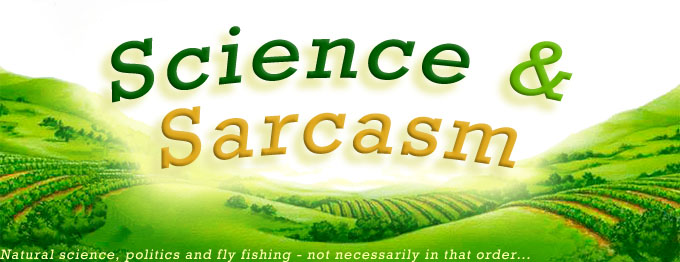On bad science journalism
A Guardian (UK) article on the predominantly bad science writing in mainstream media. [via The Sideshow]
Science stories usually fall into three families: wacky stories, scare stories and "breakthrough" stories. Last year the Independent ran a wacky science story that generated an actual editorial: how many science stories get the lead editorial? It was on research by Dr Kevin Warwick, purporting to show that watching Richard and Judy improved IQ test performance (www.badscience.net/?p=84). Needless to say it was unpublished data, and highly questionable.
...
But enough on what they choose to cover. What's wrong with the coverage itself? The problems here all stem from one central theme: there is no useful information in most science stories. A piece in the Independent on Sunday from January 11 2004 suggested that mail-order Viagra is a rip-off because it does not contain the "correct form" of the drug. I don't use the stuff, but there were 1,147 words in that piece. Just tell me: was it a different salt, a different preparation, a different isomer, a related molecule, a completely different drug? No idea. No room for that one bit of information.
Remember all those stories about the danger of mobile phones? I was on holiday at the time, and not looking things up obsessively on PubMed; but off in the sunshine I must have read 15 newspaper articles on the subject. Not one told me what the experiment flagging up the danger was. What was the exposure, the measured outcome, was it human or animal data? Figures? Anything? Nothing. I've never bothered to look it up for myself, and so I'm still as much in the dark as you.
Why? Because papers think you won't understand the "science bit", all stories involving science must be dumbed down, leaving pieces without enough content to stimulate the only people who are actually going to read them - that is, the people who know a bit about science. Compare this with the book review section, in any newspaper. The more obscure references to Russian novelists and French philosophers you can bang in, the better writer everyone thinks you are. Nobody dumbs down the finance pages. Imagine the fuss if I tried to stick the word "biophoton" on a science page without explaining what it meant. I can tell you, it would never get past the subs or the section editor. But use it on a complementary medicine page, incorrectly, and it sails through.
...
So how do the media work around their inability to deliver scientific evidence? They use authority figures, the very antithesis of what science is about, as if they were priests, or politicians, or parent figures. "Scientists today said ... scientists revealed ... scientists warned." And if they want balance, you'll get two scientists disagreeing, although with no explanation of why (an approach at its most dangerous with the myth that scientists were "divided" over the safety of MMR). One scientist will "reveal" something, and then another will "challenge" it. A bit like Jedi knights.
The danger of authority figure coverage, in the absence of real evidence, is that it leaves the field wide open for questionable authority figures to waltz in. Gillian McKeith, Andrew Wakefield, Kevin Warwick and the rest can all get a whole lot further, in an environment where their authority is taken as read, because their reasoning and evidence is rarely publicly examined.
Read the whole thing. The author has many more good points than those I've excerpted.
The Fly Fishing Loop is sponsored by flydepot.com
[ Home Waters | Next | Random | List | Search ]

This work is licensed under a Creative Commons Attribution-NonCommercial-ShareAlike 2.5 License.





